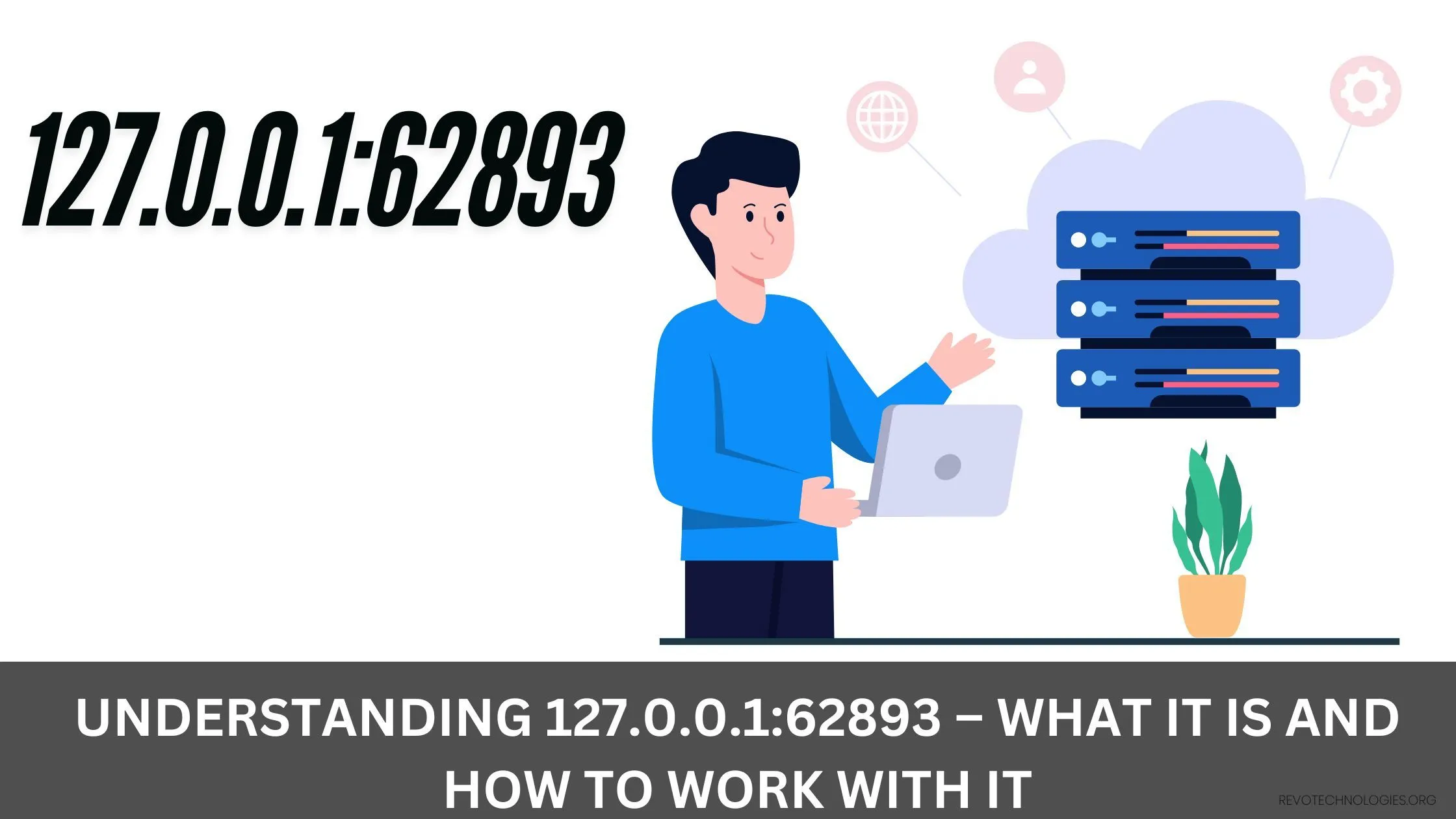You may wonder what 127.0.0.1:62893 means and why it’s important when you encounter such an IP address. There are two parts to this address: the loopback IP address 127.0.0.1 and the port number 62893.
We will examine what this address means, why it’s used, and how it’s relevant in different contexts like web development, networking, and security.
What is 127.0.0.1:62893?
The 127.0.0.1 part is a loopback address in networking. It’s an IPv4 address that points back to your own computer or device, allowing it to send data to itself. The most common use of this address is for testing and troubleshooting networks. You can use it to verify that your own network stack is working properly without connecting to external servers.
What does the 62893 part mean? The port number 62893 specifies a particular service or application running on your computer. Using 127.0.0.1 (the address) and 62893 (the port), your system connects to a specific application on your local machine that listens on that port.
Why is 127.0.0.1 Important?
The 127.0.0.1 address is extremely important in computing. It belongs to a range of addresses reserved for loopback interfaces, which are network interfaces that connect back to your computer. Loopback allows your computer’s applications and services to communicate without requiring an external network connection.
Many scenarios use 127.0.0.1, including:
- Testing servers and web applications: Developers use this to test websites locally before deploying them live.
- Network troubleshooting: It is used by network administrators to ensure that the network stack is functioning properly.
- Security testing: For testing firewalls, VPNs, and other security tools, it simulates real network traffic.
Breaking Down the Structure of 127.0.0.1:62893

Let’s take a closer look at how this address works.
- 127.0.0.1: As mentioned earlier, this is a loopback IP address. The address is used for self-testing, so any service listening on it will only accept connections from the same device.
- 62893: Here is the port number. Ports are virtual endpoints for networking communication. Different services use different ports. Web servers typically use port 80 for HTTP and port 443 for HTTPS, while applications can use any custom or dynamically assigned port.
Together, they make up a local network address. This combination allows software to send and receive data locally without exposing it to the wider internet.
Learn About 127.0.0.1:49342
Why Would You Use 127.0.0.1:62893?
Local Testing and Development
Developers commonly use 127.0.0.1 for testing and local development. As an example:
- Web Servers: During development, you might run a local web server (such as Apache or Nginx). You can connect to it using the loopback address instead of hosting it online (e.g., http://127.0.0.1:62893).
- Databases: To avoid network configuration complications, developers test database connections on their local machines using loopback addresses.
- Application Testing: 127.0.0.1 can be used to test an application that connects to services or APIs on the same device.
How to Use Port Numbers with 127.0.0.1
The port number 62893 refers to the port used by a particular application or service on your computer. Multiple applications or services requiring network communication will each be assigned a unique port number.
For example:
- The address 127.0.0.1:62893 may be the address of the service you’re developing or testing.
- A local web server’s address may be 127.0.0.1:8080.
- There is a possibility that 127.0.0.1:3306 refers to a local MySQL database.
Port Number Security Considerations
In spite of the fact that port numbers like 62893 might seem arbitrary, they are essential for system security. In order to find vulnerabilities, attackers often scan common ports. It is possible to reduce the likelihood of automated attacks by using higher, non-standard port numbers (like 62893).
Common Use Cases for 127.0.0.1:62893

Web Development
The IP address 127.0.0.1:62893 can be used in several contexts by developers:
- Local Web Servers: To develop and test websites, you might run a local web server. By accessing it via 127.0.0.1:62893, only the local machine can access it.
- API Testing: APIs are often tested locally before they are made public by developers. By setting up a server listening on a specific port, you can accomplish this.
Debugging and Troubleshooting
- Network Stack Tests: Using 127.0.0.1, IT professionals can test whether their network interfaces and services are configured correctly without involving an external network.
- Firewall and VPN Checks: When configuring firewalls or VPNs, using 127.0.0.1 will allow you to test your configurations safely without exposing your device to the wider world.
Security Research
Researchers may also use 127.0.0.1:62893 to test vulnerabilities in web applications, databases, or other locally run services. It prevents accidental exposure to real-world threats by isolating the testing environment.
How to Handle Port Numbers Effectively
In addition to knowing the basics of the loopback IP 127.0.0.1, you should also know how port numbers work.
1. Avoid Common Ports
Although port numbers above 1024 are considered dynamic or ephemeral, avoiding ports in the well-known range (0-1023) is generally recommended. As a result, conflicts with system services are reduced.
2. Use Secure Configurations
In order to prevent unauthorized access, ensure that local services are properly secured and only accessible via 127.0.0.1.
3. Port Forwarding and NAT
Port forwarding might be useful if you need to make a service running on 127.0.0.1 available externally (such as when testing an app remotely). As a result, traffic can pass through your router and connect to the right port on your local computer.
Comparison of Common Port Numbers
| Port Number | Service/Protocol | Usage |
| 80 | HTTP | Standard port for web servers |
| 443 | HTTPS | Secure web server communication |
| 3306 | MySQL | Database communication |
| 62893 | Custom/Local Application | Typically used for custom local services |
Use Cases for 127.0.0.1
| Use Case | Description | Example Port |
| Local Web Development | Testing websites locally before deploying | 62893 |
| Database Testing | Running a local database server for development | 3306 |
| Security Testing | Simulating traffic for firewall or VPN testing | Custom Port (e.g., 62893) |
| Network Troubleshooting | Ensuring the network stack is working without external traffic | 127.0.0.1:8080 |
Understand ErrorDomain=NSCocoaErrorDomain&ErrorMessage=Could Not Find the Specified Shortcut.&ErrorCode=4
Conclusion: The Role of 127.0.0.1:62893 in Local Networking
Essentially, 127.0.0.1:62893 is a combination of a local IP address and a port number that is crucial for development, testing, and debugging. The 127.0.0.1 loopback address ensures that your network traffic doesn’t leave your machine, making it ideal for secure, isolated testing.
Using this address and port combination correctly can improve your local development workflow, enhance network troubleshooting, and strengthen security practices. You can use 127.0.0.1:62893 and similar addresses as powerful tools, whether you’re a developer, network administrator, or security researcher.
Using port numbers securely and adhering to best practices will ensure a smoother, safer experience in your local network.
Source: Revo Technologies Murray Utah
Frequently Asked Questions
What Happens if Multiple Applications Use the Same Port on 127.0.0.1?
Using the same port (e.g., 62893) on the 127.0.0.1 address causes a conflict. Multiple services cannot be bound to the same port simultaneously, resulting in an error for one or both applications. Conflicts like these can be identified and resolved with tools such as netstat or lsof.
Can Port 62893 on 127.0.0.1 Be Exploited for Attacks?
Yes, it is true that misconfigured services running on 127.0.0.1:62893 may be vulnerable to attacks if they are exposed through improper port forwarding or proxy configurations. Localhost is isolated, but software weaknesses or accidental external exposure could compromise security.
Is 127.0.0.1:62893 Usable in Docker or Virtualized Environments?
127.0.0.1 refers to the loopback address within a containerized setup like Docker. In order to access a service on 127.0.0.1:62893 from the host machine, port forwarding must be explicitly configured in the container’s network settings.
Can You Use 127.0.0.1:62893 for Load Testing?
Using a test script targeting 127.0.0.1:62893, you can simulate load testing for an application. Using this method, the application can handle high traffic locally without relying on external networks.
How Can You Ensure Secure Access to 127.0.0.1:62893?
In order to secure 127.0.0.1:62893, follow these steps:
- You should use a firewall to restrict access to only trusted processes.
- This port should be protected by strong authentication.
- Ensure that software is regularly updated to fix vulnerabilities.
- Port forwarding or proxy misconfigurations should be avoided to avoid unnecessary exposure.







